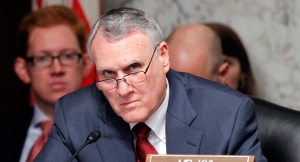By Tom Collina
As ACA reported in a recent blog post, the State Department announced June 1 that Russia's nuclear arsenal is already below the limits set by the New START treaty. Most people would say it's a good thing that there are now less deployed nuclear weapons in Russia that could be aimed at the United States. Most people would say it's good that Moscow reduced its forces early, rather than wait until 2018, as the treaty allows both sides to do. And most people would say that New START has already made America safer.
 Sen. John Kyl R-Ariz. (Image Source: AP)
Sen. John Kyl R-Ariz. (Image Source: AP)
But Sen. Jon Kyl (R-Ariz.) is not most people. Indeed, he laments that Russia has made its reductions so fast. He would have preferred, it would seem, that Moscow had taken its time and left its warheads deployed years longer, where they would have posed a greater threat to the United States. As is often the case with Sen. Kyl, reality is stranger than fiction.
In a June 6 Senate floor speech, Sen. Kyl argued that "the New START treaty is perhaps the first bilateral treaty that resulted in U.S. unilateral reductions in nuclear forces."
Or perhaps not. How is it "unilateral" for both sides to have equal treaty limits? The only thing even vaguely "unilateral" about New START is that Moscow met its commitments first, while the United States will take years to comply. We can only deduce from this that Sen. Kyl would rather have MORE Russian nuclear weapons deployed today, not less. One can almost imagine Sen. Kyl arguing against Russian "unilateral" reductions.
Sen. Kyl selectively quoted from ACA's blog post, noting that "even the Arms Control Association" recognized that Russia had met its obligations. What he failed to note is that we predicted Sen. Kyl and others would use this new information to criticize New START, and we pre-empted him: "New START critics may say that the treaty was unnecessary, since Russia was reducing its forces anyway. But in fact New START gave Russia the confidence, in terms of being able to predict future U.S. force levels, to continue its reductions and not stop or reverse them."
Sen. Kyl fails to grasp that without New START:
• Russia may not have reduced its nuclear forces so quickly.
• Russia would not now be subject to New START limits on how many weapons it can deploy, and
• The United States would not be able to confirm Russia's reductions, as we can now thanks to on-site inspections under the treaty.
Rather than criticizing Moscow for reducing its arsenal too fast, maybe Sen. Kyl should criticize the Obama administration for not reducing the U.S. arsenal fast enough. After all, if the United States had also met its New START obligations by now, there would be nothing "unilateral" for Sen. Kyl to complain about.
Moreover, instead of worrying that the next round of treaty reductions may also be "unilateral," maybe Sen. Kyl should push for deep cuts below Moscow's current arsenal levels, to make sure that Russia has to really reduce. This would have the added benefit of giving Moscow an incentive to not build-up its arsenal to reach New START levels.
